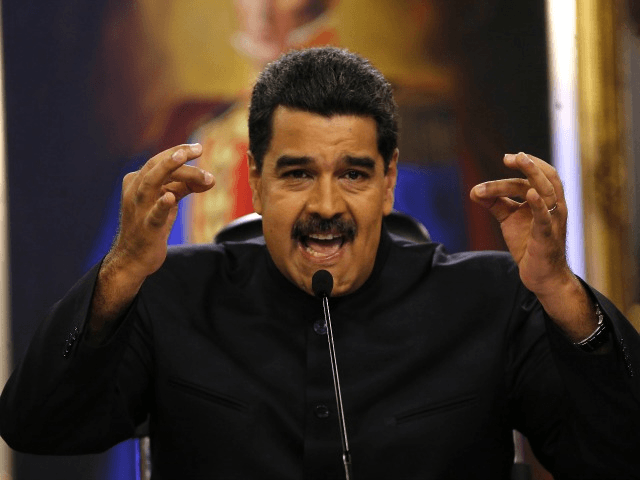Venezuela’s foreign minister Samuel Moncada announced Tuesday that the socialist government would conduct a “profound review” of U.S.-Venezuela relations after President Donald Trump referred to head of state Nicolás Maduro as a “bad leader who dreams of becoming a dictator” and threatening further sanctions.
Maduro’s government is currently organizing the creation of a “National Constituent’s Assembly” tasked with drafting a new constitution that would cement his stranglehold over the presidency, even as a national opposition-led vote found that 98 percent of Venezuelan citizens around the world oppose the measure.
“As per instructions from President Maduro, we will conduct a profound review of relations with the government of the United States because we will not accept threats from anyone,” Moncada said Tuesday, claiming that Trump’s statements in support of the referendum and against the new constitution—and his threat of further sanctions on the government for human rights abuses—”threatens not only individuals but all people” in the country.
Moncada replaced the controversial Delcy Rodríguez as foreign minister, whose tenure was marked by embarrassing episodes before the Organization of American States (OAS) in which she decreed any criticism of the Venezuelan regime “racist.” Rodríguez is a candidate to serve in the Constituents’ Assembly and help write the new constitution.
Maduro himself addressed Trump’s statements on television Tuesday night, reading aloud a statement from the U.S. government demanding Maduro cease attempting to replace the nation’s constitution and joking that the statement referred to him as “president,” saying, “That’s a first—one point for us!”
“The government of Venezuela responds that the proposal of the Original Constituent Power and National Constituents’ Assemly is in the hands of the people and belongs exclusively to the sovereign people of Venezuela,” Maduro asserted in remarks the Venezuelan state network VTV describes as a “warning” against “the vulgar, interventionlist, interfering, and destabilizing threats from the White House and U.S. Department of State.”
On Twitter, Maduro announced he would activate Article 323 of the Constitution which allows for the “defense of the historic anti-colonialist and anti-imperialist history of our nation.” While Maduro’s new constitution would presumably greatly expand his powers, Venezuela is still ruled by a nearly two-decade-old constitution written under dictator Hugo Chávez. Maduro wrote that this move was necessary “to respond fully to the Imperialist threat. … The response will be very firm”:
He decicidido activar el ConsejodeDefensadelaNación de acuerdo al 323 de la Constitución,para responder integralmente la amenaza Imperial…
— Nicolás Maduro (@NicolasMaduro) July 18, 2017
La respuesta será muy Firme,en defensa del Patrimonio histórico Anticolonial y Antiimperialista de nuestra Patria…Unidos Somos Invencibles
— Nicolás Maduro (@NicolasMaduro) July 18, 2017
On Monday, the White House issued a statement from President Trump supporting the referendum against the constitutional change. “Yesterday, the Venezuelan people again made clear that they stand for democracy, freedom, and rule of law. Yet their strong and courageous actions continue to be ignored by a bad leader who dreams of becoming a dictator,” President Trump said. “The United States will not stand by as Venezuela crumbles. If the Maduro regime imposes its Constituent Assembly on July 30, the United States will take strong and swift economic actions.”
Trump has previously promised America would do “whatever is necessary” to prevent the collapse of the Venezuelan state, and has met with prominent anti-socialist opposition leaders in the White House.
Maduro’s attacks against the United States occurred less than a week after the head of state claimed to be seeking “a relationship of respect between the American and Venezuelan governments.” On the occasion in which he claimed to be seeking an improved bilateral relationship, however, Maduro was also attempting to encourage American investors to pour money into his impoverished country. “I invite all American capital to come to Venezuela, we are cool,” Maduro said.
Maduro had previously referred to “comrade Trump” and thanked him for “well-priced food.” Nearly two decades into its socialist experiment, Venezuela suffers significant food shortages that leave up to 15 percent of its population relying on food waste to survive.

COMMENTS
Please let us know if you're having issues with commenting.